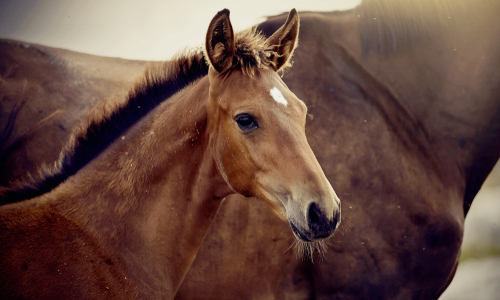Facts to Help You Care for Your Foal
- Created in Newsletter Library, Equine

Facts About Foals
Will your mare be foaling soon? Here are a few facts you'll want to keep in mind during the foal's first days and months.
Foals Don't Waste Any Time Standing
Foals may be shaky on their feet at first, but they usually manage to stand an hour or two after they're born. If your foal hasn't stood after two hours or seems to be having trouble standing, let your equine veterinarian know immediately.
The First 24 Hours Are Crucial for Your Foal's Health and Well-Being
Once the foal has been safely delivered and is nursing, it might seem as if your job is done. Unfortunately, if you don't check in on the foal and mare frequently during the first day, you may miss potential problems.
Call your equine vet if the foal doesn't nurse within the first three to five hours, doesn't defecate in the first four hours, has diarrhea, doesn't seem alert, or if the mare seems to be rejecting the foal. Scheduling an appointment with your veterinarian hours after the foal is born will help protect the health of both the foal and the mare.
Foals Benefit from Early Hoof Trimming
The Utah State University Cooperative Extension recommends trimming the foal's hooves three to four weeks after birth. The Extension notes that hoof trimming can help foals maintain correct leg structure and may even correct minor deviations. If you wait to trim until the horse is a year old, it may not be possible to make corrections.
Early Weaning May Not Be Necessary
If your foals have weaned between 4 and 7 months in the past, you may want to reconsider your weaning timeline. Separating the mare and foal to force weaning might increase stress and could cause aggression, sleep pattern changes, and other long-term issues for the foal.
In a study published in Animals in February 2020, French researchers reported that foals that weaned spontaneously at 9 to 10 months showed no effects of stress. They also noted that later weaning didn't lead to rejection by the foal or the mare.
Foals Need Small Feed Portions
Your foal obviously won't be able to eat quite as much as a mature horse, due to its small stomach size. Offering two to three small meals per day, rather than one larger meal, is recommended. The American Association of Equine Practitioners (AAEP) notes that a 500- to 600-pound foal that is no longer nursing needs to consume two to three percent of its weight in feed and forage every day.
Vaccinations Will Keep Your Foal Healthy
Colostrum, an antibody-rich liquid present in the mare's milk after the birth of the foal, provides crucial antibodies. Drinking the colostrum helps the foal avoid illness, but this protection wanes within a few months.
Following the recommended vaccination schedule will protect your foal from developing several illnesses. Foals should receive initial vaccinations for West Nile virus, rabies, tetanus, and Eastern or Western Equine Encephalomyelitis between 4 to 6 months, according to AAEP guidelines.
Foals born to unvaccinated mares may need to be vaccinated slightly earlier. Your foal may also need other vaccines, depending on which illnesses are prevalent in your area. Your equine veterinarian will let you know if your foal should receive additional vaccines.
Are you eagerly awaiting the birth of a new foal? Contact our office to schedule your new addition's first appointment.
Sources:
American Association of Equine Practitioners: Core Vaccination Guidelines
Equus: The Right Start: What Foals Need During the First 24 Hours, 7/25/19
American Association of Equine Practitioners: Foal Growth: Special Care and Nutrition
MDPI: Animals: Domestic Foal Weaning: Need for Re-Thinking Breeding Practices?, 2/23/20


